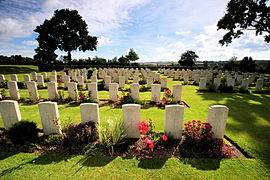You can help expand this article with text translated from the corresponding article in French. (December 2008) Click [show] for important translation instructions.
|
Hottot-les-Bagues (French pronunciation: [ɔto le baɡ] ) is a commune in the Calvados department and Normandy region of north-western France.
Hottot-les-Bagues | |
|---|---|
 Military cemetery | |
| Coordinates: 49°09′12″N 0°38′52″W / 49.1533°N 0.6478°W | |
| Country | France |
| Region | Normandy |
| Department | Calvados |
| Arrondissement | Bayeux |
| Canton | Les Monts d'Aunay |
| Intercommunality | Seulles Terre et Mer |
| Government | |
| • Mayor (2020–2026) | Colette Orieult[1] |
Area 1 | 8.39 km2 (3.24 sq mi) |
| Population (2021)[2] | 468 |
| • Density | 56/km2 (140/sq mi) |
| Time zone | UTC+01:00 (CET) |
| • Summer (DST) | UTC+02:00 (CEST) |
| INSEE/Postal code | 14336 /14250 |
| Elevation | 57–138 m (187–453 ft) (avg. 222 m or 728 ft) |
| 1 French Land Register data, which excludes lakes, ponds, glaciers > 1 km2 (0.386 sq mi or 247 acres) and river estuaries. | |
Geography
editHottot-les-Bagues lies 14 kilometres south-east of Bayeux.
History
editThe fiefdom of Normandy was created for the Viking leader Rollo. Many of the remaining place names are of Norse origin. Hottot is believed to have taken its name from the Old Norse word haugr meaning mound or low hill.
During World War II, the Allied offensive in north-western Europe began with the Normandy landings of 6 June 1944. Within the surrounding district, there was much heavy fighting through June and July 1944 as Commonwealth forces tried to press on from Bayeux in an encircling movement to the south of Caen.
Military cemetery
editHottot-les-Bagues military cemetery contains some 1,137 graves belonging to 965 British soldiers, 34 Canadians, 3 Australians, 2 New Zealanders and 1 South African, together with 132 German soldiers. Most of the war dead lost their lives in the second fortnight of June 1944, in the furious fighting around Tilly-sur-Seulles. The cemetery can be reached from Bayeux by taking the D6 southeast. After passing through Tilly-sur-Seulles, turn westward at Juvigny onto the main road (the D9) that runs from Caen towards Caumont l'Evente.
Population
edit| Year | Pop. | ±% |
|---|---|---|
| 1962 | 333 | — |
| 1968 | 323 | −3.0% |
| 1975 | 356 | +10.2% |
| 1982 | 370 | +3.9% |
| 1990 | 406 | +9.7% |
| 1999 | 470 | +15.8% |
| 2005 | 471 | +0.2% |
| 2014 | 482 | +2.3% |
See also
editReferences
edit- ^ "Répertoire national des élus: les maires" (in French). data.gouv.fr, Plateforme ouverte des données publiques françaises. 13 September 2022.
- ^ "Populations légales 2021" (in French). The National Institute of Statistics and Economic Studies. 28 December 2023.
External links
edit


